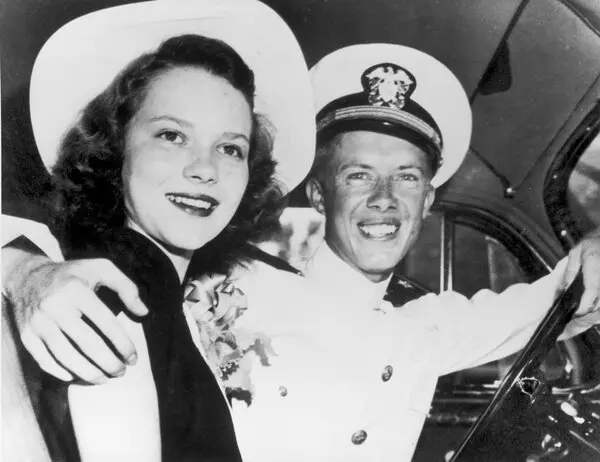
Why We Say "I do."
Jimmy, Rosalynn Carter celebrate 75 years of ‘full partnership’ this week with a word of advice to those who’re daring to say ‘I do.”

Jimmy and Rosalynn Carter
A young midshipman needed a date one evening while he was home from the U.S. Naval Academy, so his younger sister paired him with 'a friend.'
Nearly eight decades later, Jimmy and Rosalynn Carter are still together in the same tiny town where they were born, grew up and had that first outing. In between, they’ve traveled the world as Naval officer and military spouse, state senator and Governor of Georgia, American president and first lady, and finally as human rights activists and public health ambassadors. “It’s a full partnership,” the 39th president said ahead of the couple’s 75th wedding anniversary on July 7. “We show up for those in whom we believe."
There will be another milestone for the longest-married presidential couple in American history, too. At 96, Carter also is the longest-lived of the 45 men who’ve served as chief executive. Yet even having reached that pinnacle, Carter has said often since leaving the Oval Office in 1981 that the most important decision he ever made wasn’t as head of state, commander in chief, or even executive officer of a nuclear submarine in the early years of the Cold War. “It was saying ‘I do’ to Rosalynn Smith in 1945,” Carter said, “Love isn’t just something that you feel. Its something that you do.”
The Decline of Marriage
Just 2 million people were married in the United States in 2020, and only 6.1% of the U.S. population dared to say “I do.” Traditional marriage has been on a downward trajectory for generations, but the Millennials appear to be in free fall. According to a report released last month by the Pew Research Center, 25 percent of Millennials are likely to never marry. These statistics represents the most radical decline in marriage in the modern era.
A recent piece in Time Magazine entitled, “Why 25 Percent of Millennials Will Never get Married” predicts that more people under the age of 35 will stay single — forever. Yet their reason for doing so may surprise you.
In contrast to the patterns of the past, when adults in all socio-economic groups married at roughly the same rate, marriage today is more prevalent among those with higher incomes and more education, according to the Pew research.
In a recent Washington Post opinion piece, Catherine Rampell argued that “marriage is desirable but simply out of reach for many millennials.” Even as marriage rates have plummeted — particularly for the young and the less educated — Gallup survey data show that while marriage rates are in decline, young people still hope to get hitched.” Of Americans age 18 to 34, only about nine percent have both never been married and say they do not ever want to marry,” she observes. “Although there is now a growing class divide in who gets and stays married in America, there is virtually no divide in the aspiration to marry.
Today, most Americans are married or would still like to marry. The challenge, then, facing the United States is bridging the gap between the nearly universal aspiration to marry and the increasing inability to make it work.
Beta Marriage
Over 50% of all marriages fail in the United States, according to the Pew Research Center, but what if marriage stopped forcing young people to conform to an outdated tradition? Can millennials change the rules on marriage?
Psychology Today’s Susan Pease Gadoua argues “while marriage offers qualifiable benefits it’s a questionable paradigm.” Rather than establishing a mandate to marry, Gadoua suggests that ‘marital options’ would better serve a variety of people including; a) short-term trial unions for younger couples, b) child-rearing marriages for those who’d prefer just to co-parent, or c) a socially acceptable live apart arrangement.
A recent article in Time Magazine suggests that Beta-Marriage — in which millennials test-drive their nuptials before jumping into a lifelong commitment — may be a sensible alternative. Will the millennial generation usher in a new era that saves American marriage by allowing it to evolve? Radical as it may seem, they just might.
Holy and Beautiful the Custom
Much like a business, when today's couples become incompatible with one another they often downsize, outsource and sell. Yet a company is quite different from a lifelong companion in this remarkable way. While a corporation is predicated on a cost benefit analysis, an enduring companionship has no bottom line. It’s the smile around which the miracle of faith, hope and forgiveness ever turns. Sociologists agree, these were the core organizing principles of prehistoric communities.
“We developed a partnership working in the farm supply business,” Rosalynn Carter said, “and it continued when Jimmy got involved in politics.” An informal gathering is planned for the 75th anniversary later this week and the Carters' confirm that all are welcome. Of the world he served and will soon leave behind he explains:
“As I've grown older, I've become convinced that the things that matter most are the things that you can't see -- the love you share with others, your inner purpose, your comfort with who you are.” We must adjust to changing times and still hold to unchanging principles."







